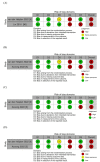Efficacy of Pelvic Floor Muscle Training for Postoperative Patients With Rectal Cancer: A Systematic Review and Meta-Analysis
- PMID: 38205462
- PMCID: PMC10776499
- DOI: 10.7759/cureus.50287
Efficacy of Pelvic Floor Muscle Training for Postoperative Patients With Rectal Cancer: A Systematic Review and Meta-Analysis
Abstract
This study aimed to assess the effectiveness of pelvic floor muscle training (PFMT) for fecal incontinence (FI) and health-related quality of life (HR-QOL) after colorectal cancer surgery. This systematic review (SR) and meta-analysis included randomized controlled trials (RCTs) that examined the effects of PFMT after colorectal cancer surgery, which were extracted from several databases in January 2023. The primary outcomes were FI (Wexner scores), HR-QOL, and adverse events. We used the Grading of Recommendations, Assessment, Development, and Evaluation (GRADE) approach to assess the certainty of evidence (CoE). A total of seven RCTs were included. Our SR results suggested that PFMT showed little to no difference in FI (mean difference 0.62 higher; 95% CI: -1.26 to 2.5, low CoE) and adverse events (risk ratio 5.78; 95% CI: 0.28-117.22, low CoE). Two adverse events occurred in the PFMT group (anastomotic stenosis, suboptimal use of laxatives) and were not observed in controls. HR-QOL was measured in two RCTs using 12-item Short Form Survey (SF-12) and fecal incontinence quality of life (FIQL). Two RCTs found no trend toward a positive impact on HR-QOL. Higher quality RCTs on colorectal cancer after surgery are required. Furthermore, extending the duration of the PFMT intervention may be necessary to ensure its success.
Keywords: colorectal cancer; fecal incontinence; pelvic floor muscle training; rectal cancer; rehabilitation.
Copyright © 2023, Nakashima et al.
Conflict of interest statement
The authors have declared that no competing interests exist.
Figures



Similar articles
-
Pelvic floor muscle training for preventing and treating urinary and faecal incontinence in antenatal and postnatal women.Cochrane Database Syst Rev. 2020 May 6;5(5):CD007471. doi: 10.1002/14651858.CD007471.pub4. Cochrane Database Syst Rev. 2020. PMID: 32378735 Free PMC article.
-
Pessaries (mechanical devices) for managing pelvic organ prolapse in women.Cochrane Database Syst Rev. 2020 Nov 18;11(11):CD004010. doi: 10.1002/14651858.CD004010.pub4. Cochrane Database Syst Rev. 2020. PMID: 33207004 Free PMC article.
-
Pelvic floor muscle training versus no treatment, or inactive control treatments, for urinary incontinence in women.Cochrane Database Syst Rev. 2018 Oct 4;10(10):CD005654. doi: 10.1002/14651858.CD005654.pub4. Cochrane Database Syst Rev. 2018. PMID: 30288727 Free PMC article.
-
Pelvic Floor Muscle Training Versus Watchful Waiting and Pelvic Floor Disorders in Postpartum Women: A Systematic Review and Meta-analysis.Female Pelvic Med Reconstr Surg. 2018 Mar/Apr;24(2):142-149. doi: 10.1097/SPV.0000000000000513. Female Pelvic Med Reconstr Surg. 2018. PMID: 29474288
-
Effect of pelvic floor muscle training using mobile health applications for stress urinary incontinence in women: a systematic review.BMC Womens Health. 2022 Oct 3;22(1):400. doi: 10.1186/s12905-022-01985-7. BMC Womens Health. 2022. PMID: 36192744 Free PMC article.
Cited by
-
Pelvic floor rehabilitation in cancer survivorship: an umbrella review.J Cancer Surviv. 2024 Nov 25. doi: 10.1007/s11764-024-01713-0. Online ahead of print. J Cancer Surviv. 2024. PMID: 39581933 Review.
-
Effectiveness of rehabilitation interventions in patients with colorectal cancer: an overview of systematic reviews.J Rehabil Med. 2025 Jan 24;57:jrm40021. doi: 10.2340/jrm.v57.40021. J Rehabil Med. 2025. PMID: 39849998 Free PMC article. Review.
References
-
- Functional outcomes of surgery for colon cancer: a systematic review and meta-analysis. Verkuijl SJ, Jonker JE, Trzpis M, Burgerhof JG, Broens PM, Furnée EJ. Eur J Surg Oncol. 2021;47:960–969. - PubMed
-
- Prospective evaluation of bowel dysfunction after rectal cancer surgery. Ribas Y, Martín-Baranera M, Cayetano L, Maristany C, Bargalló J, Delgado S, Muñoz-Duyos A. Support Care Cancer. 2022;30:5939–5947. - PubMed
-
- Efficacy of pelvic floor rehabilitation for bowel dysfunction after anterior resection for colorectal cancer: a systematic review. Chan KY, Suen M, Coulson S, Vardy JL. Support Care Cancer. 2021;29:1795–1809. - PubMed
Publication types
LinkOut - more resources
Full Text Sources
Research Materials
